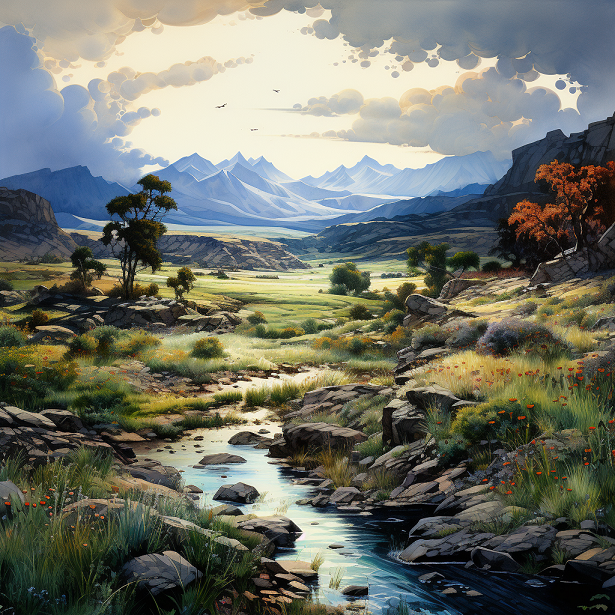Luristan, a name that resonates with an aura of mystique and untamed wilderness, emerges as a captivating backdrop in the timeless narratives of Freya Stark, the intrepid English explorer and celebrated travel writer who graced the world from 1893 to 1993. Stark’s explorations throughout the Middle East have left an indelible mark on the realm of travel literature, and among her notable works, “Valley of the Assassins” stands as a testament to her unquenchable thirst for adventure.
Here, we embark on a journey alongside Freya Stark as she unveils the mysteries concealed within the heart of Luristan, a region that beckons explorers with promises of enchantment and uncharted landscapes. Luristan, renowned for its streams that appear as mere blue lines on maps and its undulating hills that invite interpretation, remains an ideal sanctuary for those in pursuit of unparalleled adventure.
Varazan Pass
Stark’s odyssey commences with an evocative journey to the Varazan Pass, a path that weaves its way through this unexplored territory. Nihavend, a humble town situated at the threshold of this enigmatic realm, serves as the initial point of departure. It is from here that Stark, accompanied by her steadfast companion Hajji, embarks on an exhilarating ascent into the heart of Luristan. The anticipation and excitement that accompany such a journey into the unknown are palpable in Stark’s words, setting the stage for the adventures that lie ahead.
As our narrative unfolds, Stark guides us through the Varazan Pass, a location that has witnessed a remarkable transformation over time. Once under the control of audacious bandits who demanded tolls from weary travellers, the pass now stands under the vigilant watch of government forces and the police. The dynamics of this remote region are evolving, and Stark’s account offers a unique perspective on the intricate interplay between security, commerce, and tradition.
Furthermore, the author introduces readers to the volunteers from the Lur tribe, who contribute to the region’s security efforts. These Lurs, hospitable and enthusiastic, offer a glimpse into the unique social fabric of Luristan. As they share glasses of tea in the warm sunshine and engage in spirited conversations, they provide a vivid contrast to the inhospitable reputation that once cloaked this remote region.
Amidst the tea and camaraderie, the Lurs enthusiastically discuss the present security situation in Persia, revealing the optimism and hope prevalent among the region’s less privileged. Stark’s encounters with these volunteers shed light on the resilience and unity that characterise the local communities in Luristan, bound together by their shared experiences and aspirations.
Luristan’s Enigmatic Landscape
Luristan, the subject of Stark’s unyielding curiosity, remained a realm largely untouched by the footsteps of Europeans in the 1930s. In her storytelling, Stark references the accounts of fellow explorers such as Sir A. T. Wilson and Sir Henry Rawlinson, who ventured into this land before her. Their footsteps, like fleeting imprints on the sandy terrain, offer hints of past adventures and lost civilizations.
Among the historical echoes of Luristan’s past, Stark recalls notable events, including Darius’s triumph over the rebel Gautama. These references transport us to a time when this remote land played a role in the grand tapestry of history, leaving traces of its significance across the ages.
Yet, what captures Stark’s imagination are the tangible remnants of this rich history, manifested in the form of artefacts scattered across the lonely valleys. Bronze objects, flint tools, and earthenware fragments lie hidden among the undulating landscapes, each whispering tales of bygone eras. These discoveries serve as tangible reminders of the myriad unnamed and unnumbered people who once roamed these uncharted territories.
Qal’a Kafrash
As Stark’s narrative unfolds, we find ourselves standing beside her at the mound of Qal’a Kafrash in Luristan, a site steeped in history. Here, the captivating vista of the plain of Khava unfurls before our eyes, resembling a yellow wave washed by the currents of time. Stark’s evocative descriptions paint a vivid picture of this pastoral solitude, punctuated by black flocks and tents, with a meandering stream serving as its lifeblood.
It is here, amidst this breathtaking landscape, that Stark and her companions come into contact with the Lurs of Kafrash village. The vivid tapestry of Luristan’s diverse population is brought to life as Stark introduces us to the Khan’s wife, a striking beauty who commands her household with an air of authority. Her attire, adorned with vibrant hues and intricate patterns, reflects a blend of rakishness and dignity that encapsulates the essence of Luristan.
The Khan’s wife, a gracious hostess, extends her warm hospitality to the author and her entourage. Seated beside her, Stark experiences moments of genuine connection, transcending cultural boundaries. Despite their differences, the Lurs of Kafrash exude a sense of camaraderie and acceptance that leaves an indelible mark on the author.
In the quietude of the evening, as the last morsels of rice are savoured, the Lurs bestow upon the author a camp bed, a treasured possession acquired from the Russians. The sleeping arrangements, both humble and symbolic, serve as a testament to the warmth and generosity of the Khan’s family. The act of placing the author’s shoes under the mattress, an embodiment of good luck, underscores the depth of their hospitality.
Navigating the Uncharted Terrain
With the memory of a restful night spent under the hospitable roof of the Khan’s family in Qal’a Kafrash still fresh in our minds, we delve deeper into the chronicles of Freya Stark’s intrepid exploration of Luristan. As dawn breaks over this remote corner of the world, the journey unfolds with renewed vigor and anticipation.
The morning’s mist hangs in the air, creating an atmosphere reminiscent of autumn in the Scottish Highlands. The landscape, draped in a gossamer shroud, adds an ethereal quality to Stark’s expedition. As she stands on the precipice of a new day, the misty embrace of Luristan’s wilderness envelops her, shrouding her path in an aura of mystery.
However, a significant development awaits on the horizon—an alteration in the composition of Stark’s travel party. As Stark evaluates her circumstances and considers the path ahead, a pivotal decision emerges. She opts to change her guide, a choice laden with potential consequences in this unfamiliar terrain.
The guide from Nihavend, who had initially set forth on this journey, departs from the group, leaving Stark and her faithful companion, Hajji, with a solitary guide to navigate the challenges of Luristan. This reduction in the size of the escort intensifies the air of uncertainty that has hung over their expedition from the beginning.
Stark’s willingness to place her trust in the Lurs, despite the growing trepidation surrounding their journey, becomes apparent. The decision to continue the expedition with fewer escorts underscores her fearless spirit and her belief in the fundamental goodness of humanity. It is a testament to Stark’s unwavering determination to uncover the secrets of Luristan, even when the path ahead remains obscured by uncertainty.
Badavar River
Their journey resumes as they traverse the Badavar River, passing by the village of Noah. Each step brings them closer to their destination, the elusive Gatchkah Pass, where a police post stands sentinel over the route to Alishtar. The change in direction towards the Gatchkah Pass, away from the previously intended route, adds an element of unpredictability to their adventure.
Unexpected Encounters: A Twist in Stark’s Luristan Expedition
Having made the courageous decision to continue her expedition with fewer escorts and a new guide, Stark and her faithful companion, Hajji, forge ahead. Their path leads them through the picturesque Badavar River, and they pass by the humble village of Noah, each step bringing them closer to the Gatchkah Pass, a place of significant importance on their journey.
However, as the landscape around them transforms, the unexpected comes to the forefront. In a surprising deviation from their initially intended route, Stark and her companions stumble upon an unfinished motor road—a stark contrast to the rugged terrain they had grown accustomed to. But this unexpected encounter is merely a prelude to what awaits them.
As they proceed along this road, a figure in a pale-blue uniform materialises on the horizon—a policeman. The sudden appearance of this law enforcement officer, an emblem of authority in the wilderness of Luristan, surprises both Stark and the policeman himself. Their meeting is accompanied by a barrage of questions, as the policeman, clearly taken aback, seeks to ascertain the purpose and intentions of these travellers in this remote and unfamiliar land.
Stark, ever resourceful and prepared for such encounters, presents her letter of introduction—a document that carries the weight of official authority and lends credence to her journey. However, the initial shock and suspicion displayed by the policeman cast a shadow of uncertainty over the situation.
At this moment, Stark finds herself standing at a crossroads, her trust in the Lurs and her decision to venture into this unknown territory with fewer escorts called into question. The policeman’s demeanour and questioning force her to re-evaluate the complexities of the situation. It is a reminder that even the most fearless of explorers must confront unforeseen challenges in their quest for discovery.

